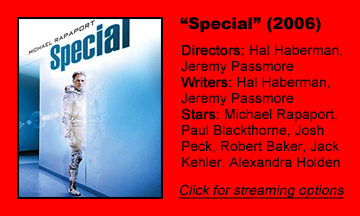“Special” (2006) has the simplest of stories – Les (Michael Rapaport) participates in a clinical trial and finds that the pills give him superpowers – but has loads of great subtext. It’s 81 minutes long and couldn’t be a minute longer without running out of things to say, but in its short run time it touches on the everyday heroism of living, the individualized nature of reality, and perhaps mental illness — but perhaps societal illness too.
Riveting Rapaport
Veteran character actor Rapaport (“Boston Public”) gives a magnetic turn as an Everyman parking meter reader who loves comic books and has a big heart. Les’ New York accent conveys a certain street toughness, but his voice is also childlike, matching his interests and sense of wonder.
Despite the low budget, writers-directors Hal Haberman and Jeremy Passmore surround their star with actors talented enough that you’re never taken out of the film.
Alexandra Holden is endearing as Maggie, the grocery clerk whom Les has a crush on; Robert Baker and Josh Peck are Everett and Joey, the comic store guys who like getting high; Jack Kehler is Dr. Dobson, who dispenses the pills; and Paul Blackthorne and Ian Bohen are the Exiler brothers running the Special program. You’ll recognize the faces of most of them, if not their names.
Manash Raval and Tom Wolfe are “Special’s” secret weapons as they convey the indie tone with childlike piano music that falls just shy of obvious in its manipulation. Cinematographer Nelson Cragg showcases the unnamed city’s dirty backstreets at night. It’s dangerous, sure, but you also want to breathe in the crisp night air of this place.
“Special” has a lightly humorous vibe at times, but it’s not going for guffaws. The comic shop scenes make me think of “Clerks,” but it doesn’t embrace verbose comedy. I also think of “Super,” but this isn’t about shocking violence.
Les, wearing a filthy white jumpsuit that’s awful even by cheapo superhero standards, does get the crap beat out of him, but this isn’t a commentary on violence; it’s a commentary about getting beaten down, physically or otherwise.
Not content with one tone
“Special” doesn’t settle on a single tone for any notable stretch, and that’s its most noteworthy flaw (although, as noted, the music covers this up). The comic-book shop seems like a fun place to hang out, but we’re not there for long. We do feel for Les when he gets beat up by his enemies, but then he gets up; we’re given a quick reprieve.
Les starts out with such ennui – he’s so hopeful when he’s approved for the clinical trial – that his tiny steps toward self-confidence feel like little victories. At the same time, Haberman and Passmore don’t let us trust any of this because they cleverly switch points of view and we can’t know who to believe. “Special” could actually be a profound tragedy.
As far as Les is concerned, he has gained an array of superpowers. But from other POVs, he’s crazy. Les believes he’s running through a wall, but Everett and Joey see him running into a wall. But Les’ bloodied nose could be from exerting his powers, and the stoners’ perceptions maybe aren’t reliable. The film keeps us guessing, milking a good mystery from this either/or scenario.

(The biggest thing that made me doubt Les is the sheer variety of his powers. He can phase like Shadowcat, teleport like Nightcrawler, disappear like the Invisible Woman, read minds like Buffy in “Earshot” … but he doesn’t do all of these things at once.)
The innocent likability conveyed by Rapaport gets us through watching Les get through each day. And then you can attach whatever metaphors you want on top of that. Getting maximum mileage out of its budget, “Special” is a little gem in the superhero genre.


